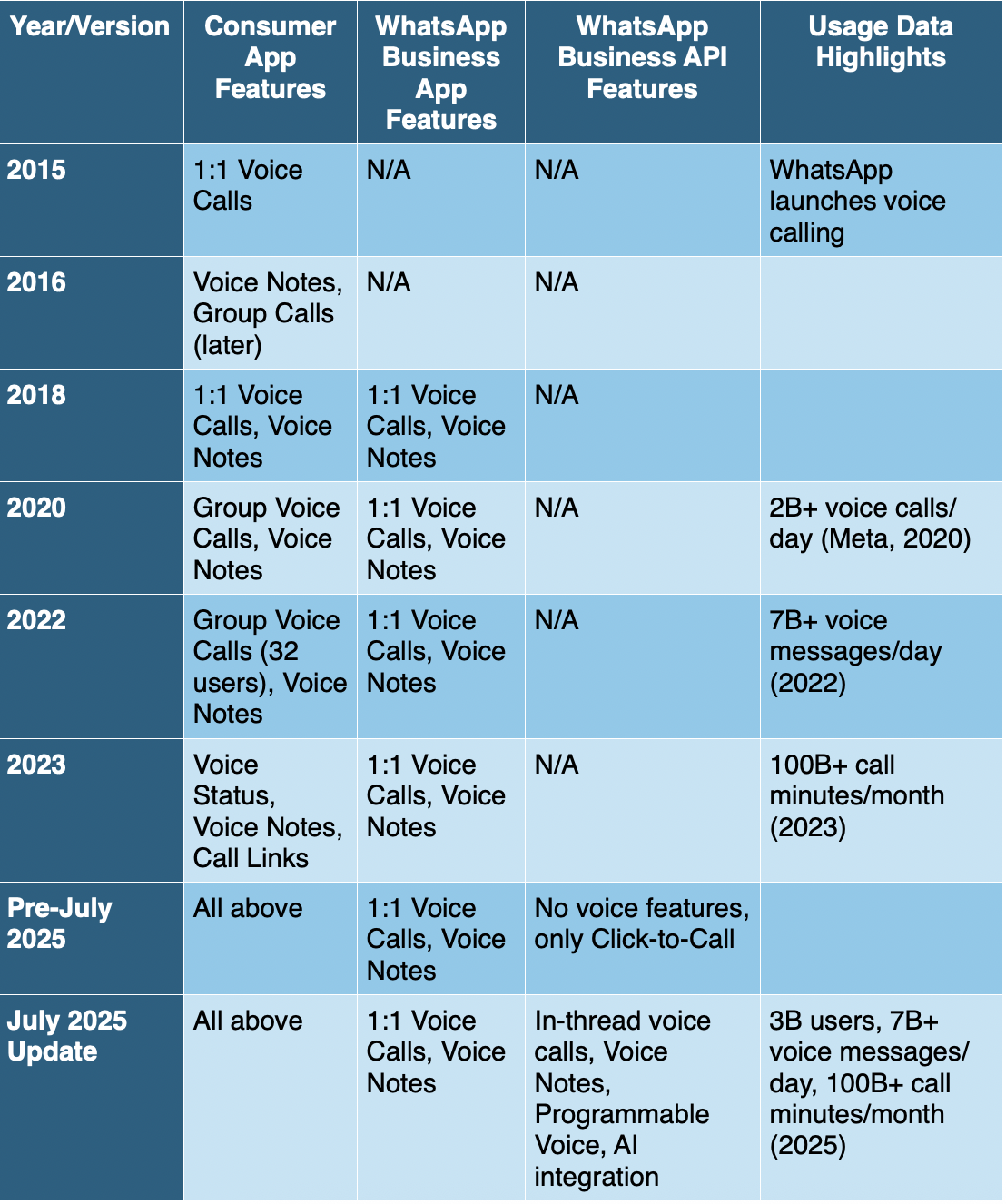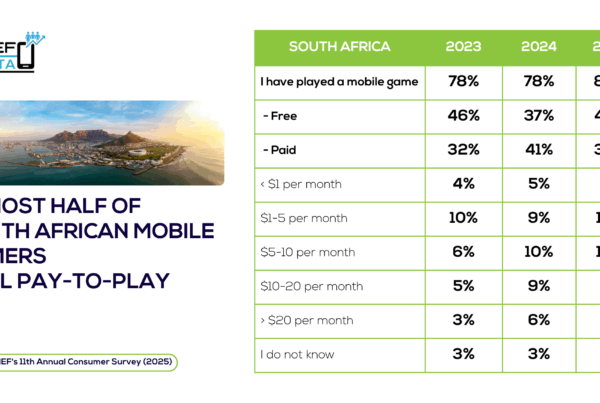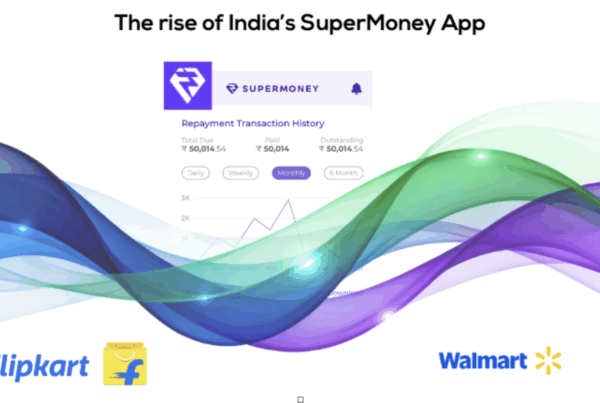WhatsApp Business voice capabilities have progressed from limited manual calls and voice notes to a fully integrated, AI-enabled platform supporting in-thread voice calls and programmable voice messaging via API. This transformation enables businesses to provide seamless, context-rich customer interactions, driving substantial revenue growth and reshaping the mobile ecosystem. MEF CEO Dario Betti examines how these advancements unlock strategic value and create new opportunities for enterprises and service providers alike.
Until July 2025, voice features in WhatsApp Business were fragmented and limited by business size. Small businesses using the free WhatsApp Business App could make and receive manual 1:1 voice and video calls, but only within the app—without automation, integration, or workflow support.

Voice notes were available for informal exchanges, but large enterprises using the WhatsApp Business API had no access to either voice calling or asynchronous audio messaging. Businesses could deploy Click-to-Call ads, but these routed users to traditional phone calls, breaking conversational continuity within WhatsApp threads. This left voice communication rigid, unscalable, and disconnected from chat context—highlighting a clear need for richer, more integrated features.
The July 2025 Leap Forward
At the Conversations 2025 conference in Miami, Meta announced a major upgrade for WhatsApp Business API, transforming voice into a strategic channel:
-
- In-thread voice calling: Businesses can now initiate and receive voice calls directly within the WhatsApp chat thread, preserving conversation history and context.
- Voice messaging via API: Enterprises can send and receive voice notes, enabling richer, asynchronous support and communication.
- Programmable integration: Leading CPaaS providers like Twilio and Vonage now support scalable voice workflows, allowing businesses to automate and orchestrate voice interactions.
- AI foundation: These enhancements lay the groundwork for generative AI assistants to interact with customers via voice, blending automation with human-like support.
To stay ahead, MEF members should invest in interoperability standards, voice security, and cross-channel analytics, while exploring partnerships that bridge traditional and OTT voice. MEF can play a pivotal role by convening stakeholders, sharing best practices, advocating for open access to messaging APIs, and providing research on regulatory trends.”
Consider a customer support journey: a user messages about a billing issue. Previously, escalation meant switching to a phone call—losing chat context—or continuing via text. Now, with the new voice-enabled API, an agent can initiate a voice call directly in-thread, referencing chat history for continuity. After resolving the issue, the agent can send a voice note summarizing next steps, embedding multimedia context in the thread. This seamless blend of asynchronous and interactive voice, underpinned by AI-ready infrastructure, bridges convenience with enterprise-grade communication.
Voice Strategic Value
From a business perspective, Analyst Ralph Schackart estimates that AI-enabled business services on WhatsApp could generate up to $16.6 billion in additional revenue by 2025, rising to $45 billion by 2030.
Empirical research underscores the rapid growth of voice-enabled communication. The global mobile VoIP market—including services like WhatsApp voice—was valued between $44–132 billion in 2023 (depending on methodology) and is forecast to grow at 10–13% CAGR through 2030–2032. The Voice Chat API market is projected to expand from $0.94 billion in 2024 to $2.59 billion by 2033, at a 12% CAGR.
With nearly 3 billion users by mid-2025, WhatsApp’s addressable share of these markets is vast. According to Business of Apps, WhatsApp users exchanged over 7 billion voice messages daily in 2024, and voice calls on WhatsApp (across consumer and business) exceeded 100 billion minutes per month by early 2025.
WhatsApp Voice Features: Historical Evolution

Sources: Meta Earnings, Business of Apps, TechCrunch, Precedence Research, Statista
Implications for the Mobile Ecosystem
The expansion of WhatsApp Business voice capabilities is reshaping the mobile ecosystem.
For mobile operators, the migration of business voice traffic from traditional telephony to over-the-top (OTT) platforms like WhatsApp intensifies competition and may accelerate the decline of legacy revenues. However, operators can respond by partnering with OTTs and CPaaS providers to deliver value-added services, ensure quality of service, and offer enterprise-grade connectivity. A role of pipe but a feature rich pipe.
For CPaaS providers and aggregators, the new programmable voice APIs open up fresh avenues for innovation—enabling richer customer journeys, advanced analytics, and integration with AI-powered assistants.
Brands and enterprises, meanwhile, must rethink their customer engagement strategies, leveraging in-thread voice to deliver more personal, context-rich support and sales experiences.
To stay ahead, MEF members should invest in interoperability standards, voice security, and cross-channel analytics, while exploring partnerships that bridge traditional and OTT voice. MEF can play a pivotal role by convening stakeholders, sharing best practices, advocating for open access to messaging APIs, and providing research on regulatory trends. By fostering collaboration and thought leadership, MEF empowers its members to harness the full potential of next-generation voice, ensuring sustainable growth and innovation across the mobile ecosystem.
For more insights on the evolving world of mobile messaging, become a member of the Mobile Ecosystem Forum, join our events, insight calls and exclusive information services at info@mobileecosystemforum.com.





